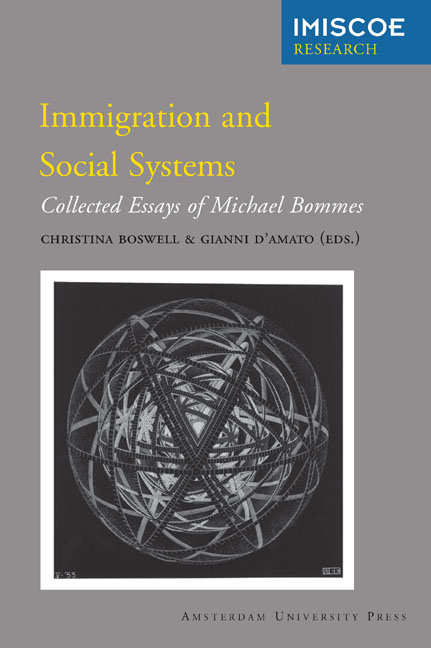Book contents
- Frontmatter
- Contents
- Foreword
- Preface
- Introduction
- 1 Migration in Modern Society
- 2 National Welfare State, Biography and Migration: Labour Migrants, Ethnic Germans and the Re-Ascription Of Welfare State Membership
- 3 Systems Theory and the ‘Ethnic Inequality’ of Migrant Workers
- 4 Welfare Systems and Migrant Minorities: The Cultural Dimension of Social Policies and its Discriminatory Potential
- 5 Transnationalism or Assimilation?
- 6 ‘Integration takes Place Locally’: On the Restructuring of Local Integration Policy
- 7 Illegal Migration in Modern Society: Consequences and Problems of National European Migration Policies
- 8 General and Specific Characteristics of Networks: (with Veronika Tacke)
- 9 National Paradigms of Migration Research: (with Dietrich Thränhardt)
- References
- Other IMISCOE Titles
2 - National Welfare State, Biography and Migration: Labour Migrants, Ethnic Germans and the Re-Ascription Of Welfare State Membership
Published online by Cambridge University Press: 09 January 2021
- Frontmatter
- Contents
- Foreword
- Preface
- Introduction
- 1 Migration in Modern Society
- 2 National Welfare State, Biography and Migration: Labour Migrants, Ethnic Germans and the Re-Ascription Of Welfare State Membership
- 3 Systems Theory and the ‘Ethnic Inequality’ of Migrant Workers
- 4 Welfare Systems and Migrant Minorities: The Cultural Dimension of Social Policies and its Discriminatory Potential
- 5 Transnationalism or Assimilation?
- 6 ‘Integration takes Place Locally’: On the Restructuring of Local Integration Policy
- 7 Illegal Migration in Modern Society: Consequences and Problems of National European Migration Policies
- 8 General and Specific Characteristics of Networks: (with Veronika Tacke)
- 9 National Paradigms of Migration Research: (with Dietrich Thränhardt)
- References
- Other IMISCOE Titles
Summary
Introduction
In modern society individuals are not ‘members of society’. The chances to become included in different social realms – the economy, law, politics, education, health and the family – are no longer based on descent, or belonging to a social strata, or to an ethnic or religious group. It is individuals themselves that principally achieve inclusion in these different social realms and the risks of failure are high. Consequently, if we understand modern national welfare states as organisational complexes which try to heighten the chances of inclusion and minimise risks of exclusion for their citizens, then one central structural form of providing inclusion has been the institutionalisation of the modern life course (Kohli 1985). In this chapter, I discuss the reasons why this institutionalisation of the life course and the safeguard within it of individuals with a structured biography have become central for the mode of operation of welfare states. I then show that migrations that transgress state borders highlight some very specific social preconditions of these arrangements for inclusion. If biographies are understood as the result of a sequential process in which chances for social participation, supported by welfare states, are accumulated, then migrants are likely to be structurally poor because of their specific relation to national welfare states.
The chapter then develops these core observations with a case study of the immigration of ethnic Germans and labour migrants in Germany. It demonstrates that migration makes some of the structural preconditions of the modern life course regime visible. It also shows that migration can be taken as part of a process that erodes the classical arrangement by which welfare states provide an ordered life course for the members of the national community, i.e. for their citizens, in exchange for political loyalty.
The ‘social construction’ of biographies through organisations
The participation of individuals in modern society is no longer based on a unitary principle of inclusion and exclusion. The social conditions of inclusion, i.e. the mode by which individuals become engaged, are defined by the differentiated social systems of society: the economy, the law, politics, education or health. If individuals fulfil the functionally specific requirements of these systems then they are included.
- Type
- Chapter
- Information
- Immigration and Social SystemsCollected Essays of Michael Bommes, pp. 37 - 58Publisher: Amsterdam University PressPrint publication year: 2013



